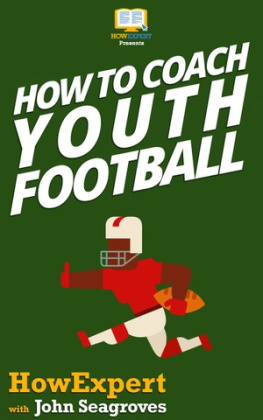Copyright 2012 by Jeffrey A. Ourvan
All Rights Reserved. No part of this book may be reproduced in any manner without the express written consent of the publisher, except in the case of brief excerpts in critical reviews or articles. All inquiries should be addressed to Skyhorse Publishing, 307 West 36th Street, 11th Floor, New York, NY 10018.
Skyhorse Publishing books may be purchased in bulk at special discounts for sales promotion, corporate gifts, fund-raising, or educational purposes. Special editions can also be created to specifications. For details, contactthe Special Sales Department, Skyhorse Publishing, 307 West 36th Street, 11th Floor, New York, NY 10018 or .
Skyhorse and Skyhorse Publishing are registered trademarks of
Skyhorse Publishing, Inc., a Delaware corporation.
Visit our website at www.skyhorsepublishing.com.
10 9 8 7 6 5 4 3 2 1
Library of Congress Cataloging-in-Publication Data is available on file.
ISBN: 978-1-61608-357-1
Printed in China
For Jake, Kevin, and Vince
Its what you learn after you know it all that counts.
Earl Weaver
FOREWORD
There have been two very large influences in my life. The first, of course, is baseball.
My father, Pedro, was the greatest Puerto Rican baseball player of his day, and he played alongside legends such as Satchel Paige, Josh Gibson, and Roy Campanella. But those were the days before Jackie Robinson, and my father had no hope of ever making it to the big leagues or of earning a real living through the game. In fact, throughout his entire baseball career, and my youth, my family was extremely poor.
My father played baseball for one reason: He loved the game. As kids, my brothers and I also played for the same reason. Starting at around age nine, it was all I ever wanted to do, morning till night, seven days a week, all year round. But when I was thirteen I almost walked away from the game forever. There was a team then that I very much wanted to play for, but I had to come up with a registration fee and my family didnt have the money. It was all of fifty cents. So my mother, seeing me in tears, had to work extra to scrape it together, and finally I registered for the team. I showed up at our first practice. There was a uniform there for everyone except me. It turned out that I wasnt good enough to have been chosen. I was devastated. There were no words of encouragement to me from the coach. Instead, I was ignored and left to drag my poor self home.
I decided right there that I would never play baseball again. For two years I didnt even touch a bat and ball. If it wasnt for my brothers encouragement, and also my fathers wise patience, I may never have come back. In my case, of course, that would have meant no World Series championship, no MVP, no All-Star Game appearances and no Baseball Hall of Fame. I sometimes wonder whether that coach, back then, might have handled that situation with me in a more thoughtful way.
The second large influence in my life has been my faith in Buddhism. Among the many things Buddhism has taught me is that everyone is inherently equal, and everyone is worthy of respect. In other words, each person has something valuable to contribute if given the chance.
This very fine and necessary book couples the beauty of baseball together with an emphasis on consideration toward each child who plays the game. It values the importance of winning. And it offers all the tools and basic baseball coaching skills to lead your team toward that goal. At the same time, it teaches how to cherish every member of your team so that you not only win as a team but enable each child to create a winning experience in life through the game.
Who knows? With some encouragement, that kid batting at the bottom of your lineup, like me, may someday be a World Champion, too.
Orlando Cepeda
Member, National Baseball Hall of Fame
Author, Baby Bull: From Hardball to Hard Time and Back
1
THE MEANING OF WINNING
This is an instructional guide for youth baseball managers and coaches who unashamedly want their teams to win. Its also a book for those who accept the notion that they cant do this unless their least able players become a crucial part of that winning team.
There are hundreds of thousands of volunteer youth baseball coaches throughout the United States, and most, understandably, are in it because they want to spend time playing baseball with their own kids. But the position of manager or coachfrom the perspective of any child between the ages of seven and twelve who, more often than not, lives and dies for baseballis also one of significant responsibility to all the players on the team. A good or bad coach will make or break the untested baseball players experience. Its as inspiring to witness a new player improve his or her game and feel victorious as a result of the patience and respect shown by a good coach as it is heartbreaking to see a once-enthusiastic child who sours on the sport because his or her coach was a jerk.
Most volunteer coaches, of course, are good, well-meaning people and theyre almost always baseball fans too. The vast majority have children of their own on their teams. Some may have even planned to have kids just for the opportunity to someday coach youth baseball! Many coaches struggle mightily to balance yet another time-consuming activity in the midst of a heavy work schedule and other family, religious, and community obligations. Its not easy to get away with leaving work at 4 pm two to four times a week, over a three to four month period, to hit fungoes to a bunch of ten-year-olds, let alone sacrificing ones Saturday and Sunday mornings in the spring. No one who does this need be criticized or disparaged for their baseball know-how, or lack thereof, when he or she honestly cares about the children on his or her team. But the fact remains that youth baseball coaching, for many, is a first-time experience. While many coaches understand how baseball is played, fewer perceive the proper approaches to youth baseball in particular, and still fewer understand how to create an environment in which all the players are certain that theyve won.
Anyone who regularly watches or participates in the thousands upon thousands of organized baseball programs nationwide has observed two coaching archetypes: the win-at-all-costs manager, and the winning-is-not-the-point manager.
The win-at-all-costs manager is typically out for his or her own glory. This coach often shouts at umpires, opposing managers, his own players, and sometimes even the players on the other team. His relatively talented son or daughter is featured at the expense of the lesser players. His most inexperienced players are exiled to the bench or, if theyre lucky, the outfield corners, and he considers the bottom of his lineup as something that he just has to get through. He regularly criticizes his players after a lossa time when children hear nothing but blame. He is invariably the one coach most knowledgeable about the rules and regulations of his respective league, and he doesnt hesitate to agitate for enforcement of even the most obscure rule in order to secure a forfeit against a team that just beat his pants off on the field. The best interests of the children in the league are subsumed by his imperious drive to win. His players sometimes win trophies but are not especially happy. Many parents disparage him behind his back.
In contrast, the winning-is-not-the-point manager is a heck of a nice guy. For him or her, every player is outstanding, and everyone gets the privilege of playing each positionsometimes even in the same game. This manager praises every strikeout as much as every hit, even where the kid has done nothing but strike out throughout the entire season. Practices are squeezed into a half hour before the regularly scheduled game. The score and the standings never matter. Whats more important is his positional rotation, even if its time for a player who cant catch a baseball to play first base and potentially injure him or herself. Sometimes the winning-is-not-the-point manager changes his teams field positions after every out (e.g., everyone shifts one position to the right). Theres no pressure in any of his matches, his best pitcher pitches one inning every three games, his best hitter sometimes bats last in the lineup, his worst hitter first, the umpires never wrong, and its always a beautiful day for baseball. Parents enjoy the babysitting privileges of having this sort of manager take their sons or daughters off their hands for two hours at a time. Many of his players disparage him behind his back.
Next page









